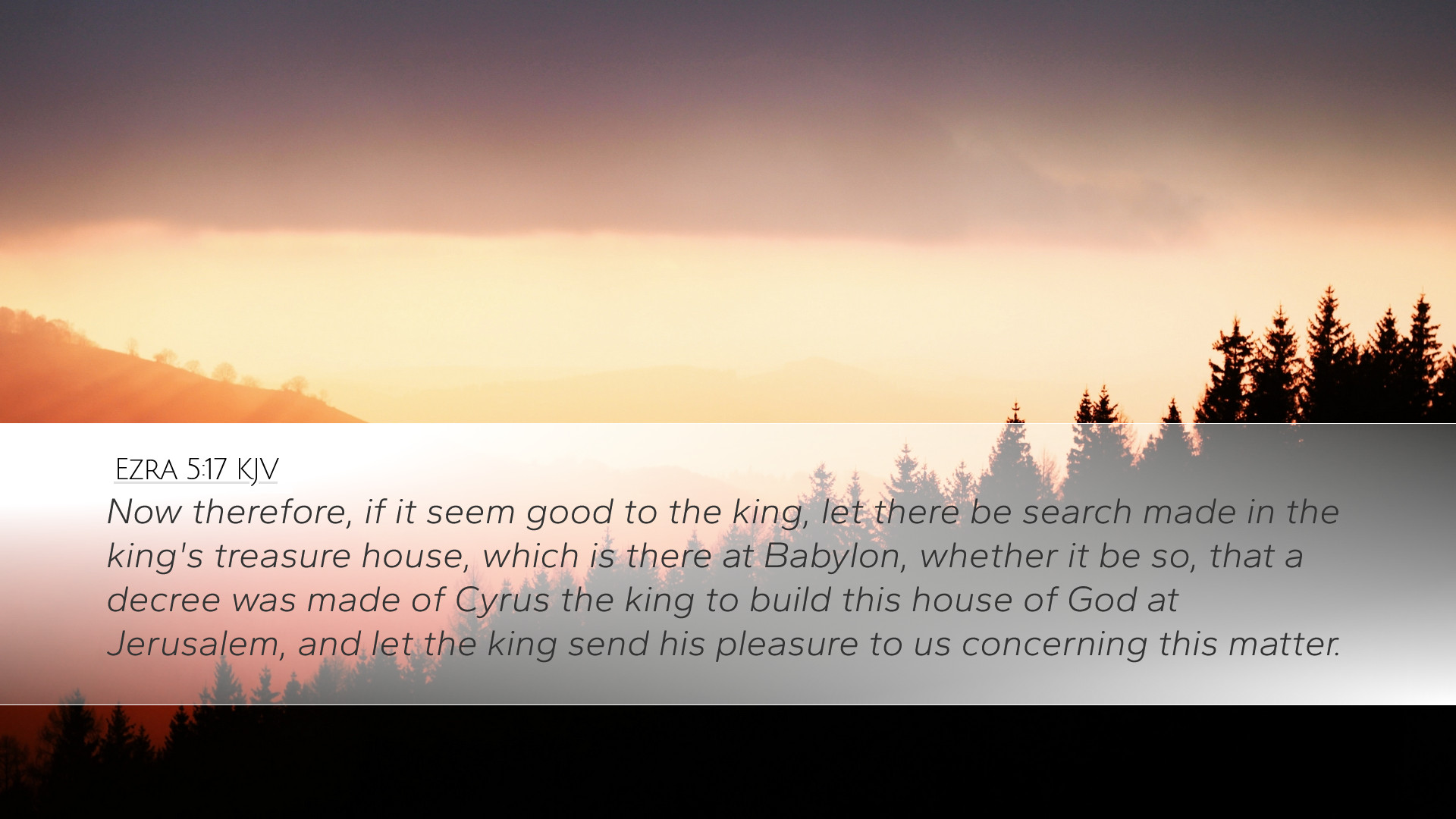Old Testament
Genesis Exodus Leviticus Numbers Deuteronomy Joshua Judges Ruth 1 Samuel 2 Samuel 1 Kings 2 Kings 1 Chronicles 2 Chronicles Ezra Nehemiah Esther Job Psalms Proverbs Ecclesiastes Song of Solomon Isaiah Jeremiah Lamentations Ezekiel Daniel Hosea Joel Amos Obadiah Jonah Micah Nahum Habakkuk Zephaniah Haggai Zechariah MalachiEzra 5:17
Ezra 5:17 KJV
Now therefore, if it seem good to the king, let there be search made in the king's treasure house, which is there at Babylon, whether it be so, that a decree was made of Cyrus the king to build this house of God at Jerusalem, and let the king send his pleasure to us concerning this matter.
Ezra 5:17 Bible Commentary
Ezra 5:17 - Commentary and Insights
Bible Verse: "Now therefore, if it seem good to the king, let there be search made in the king's treasure house, which is there at Babylon, whether it be so, that a decree was made of Cyrus the king to build this house of God at Jerusalem, and let the king send his pleasure to us concerning this matter."
Introduction
The verse in Ezra 5:17 marks a significant point in the narrative concerning the rebuilding of the temple in Jerusalem. This moment reflects the interplay of divine providence and earthly governance, a theme prevalent throughout the Scriptures. In this commentary, we will explore insights from esteemed public domain theologians such as Matthew Henry, Albert Barnes, and Adam Clarke, providing a comprehensive understanding of the context, significance, and implications of this verse.
Contextual Background
To fully grasp the importance of Ezra 5:17, one must consider the backdrop of the Israelites' return from exile. After the decree of Cyrus that allowed them to return and rebuild their temple, they faced opposition from local adversaries. This verse comes as a response to challenges that arose in the rebuilding efforts. The verse focuses on the action of the governor, which indicates a legal recourse to assert their rights in the face of opposition.
Insights from Matthew Henry
Divine Favor and Human Efforts: Matthew Henry notes that the actions described in Ezra reflect the providential care of God. The leaders of the people sought to establish the legitimacy of their mission through the king's decree. Henry emphasizes that the pursuit of divine favor requires due diligence on the part of believers—seeking confirmation from the earthly authorities that align with God's purposes.
Submission to Authority: Henry also points out that the inquiry made to the king reveals a respectful submission to authority. This is significant for the community, which had the right to defend their cause by appealing to those in power. Such actions highlight the balance between faith in God's plans and the practical steps needed to navigate the challenges in executing those plans.
Insights from Albert Barnes
The Role of Inquiry: Albert Barnes emphasizes the importance of requesting an investigation into the royal archives. This step underlines the necessity for validation of their claims when confronting opponents. Barnes elucidates that this action not only demonstrates wisdom but also the acknowledgment of lawful governance that God ordains, urging the faithful to act within the boundaries of the law when pursuing their spiritual objectives.
Historical Significance: Barnes also explores the historical context, highlighting Cyrus’ decree as pivotal. He asserts that the records held in the treasure house would serve as irrefutable evidence of God's sovereignty and the legitimacy of the rebuilding effort, showcasing that God employs earthly authorities to aid in His plans.
Insights from Adam Clarke
Legal Consideration: Adam Clarke approaches this passage by analyzing the legal implications of the inquiry. He stresses that the leaders were wise to seek royal confirmation, ensuring that their actions were not only spiritually motivated but also politically sound. Clarke reiterates that the temple’s reconstruction was not merely a religious exercise but a significant political statement before the governing powers.
God’s Sovereignty: Clarke draws attention to the overarching theme of divine governance through human agencies. He highlights that by referencing King Cyrus, the narrative underscores how God uses even pagan rulers to fulfill His purposes, reminding readers of God's omnipotence and ability to orchestrate circumstances for the good of His people.
Theological Reflections
Ezra 5:17 invites deeper theological reflection on the relationship between divine decree and human action. The leaders’ request to search the archives emphasizes the need for validation and alignment with God's will. It illustrates how faith must coexist with wise action. Here are some key theological insights:
- The Harmony of Faith and Works: This verse exemplifies the scriptural principle that faith and works are intertwined. Genuine faith seeks understanding and evidence, as seen in their appeal to the king.
- The Sovereignty of God: The request for a search in the king's house acknowledges God’s hand in history, recognizing that all authority ultimately derives from Him.
- Importance of Accountability: The narrative stresses the significance of accountability and due process within the community of believers and in interactions with governing authorities.
Practical Applications
For pastors, students, theologians, and Bible scholars, Ezra 5:17 provides several valuable applications:
- Engagement in Civic Responsibility: Believers are reminded of their responsibility to engage with civil authorities respectfully and wisely, advocating for their rights while being mindful of their witness.
- Pursuing Knowledge and Understanding: In decisions concerning their ministries and communities, faith leaders should seek both spiritual insight and practical confirmation of their paths, as demonstrated by the actions taken in this verse.
- Dependence on God’s Sovereignty: This passage encourages believers to trust in God’s sovereignty over human affairs, affirming that divine plans will prevail even amidst opposition.
Conclusion
Ezra 5:17 serves as a profound reminder of the interplay between God's purpose and human action. Insights drawn from public domain commentaries reveal a rich tapestry of theological and practical teachings that resonate with contemporary readers. By understanding the historical context and the importance of validation from earthly authorities, believers can navigate the complexities of faith and society. In all endeavors, the call remains to trust in the Lord’s sovereign governance as they seek to fulfill His purposes.


